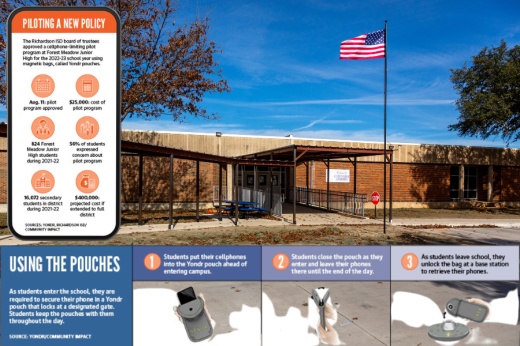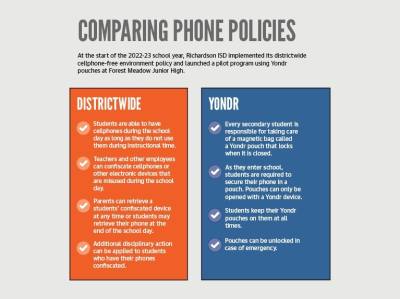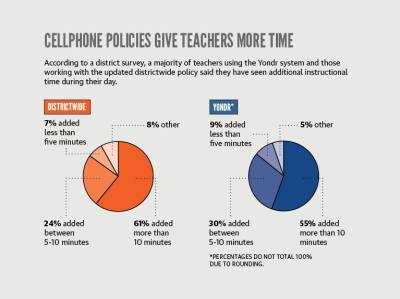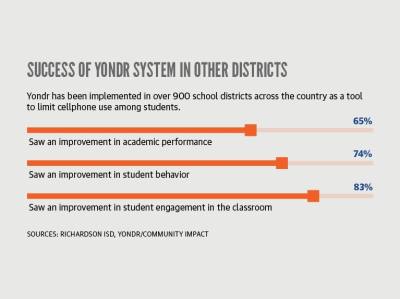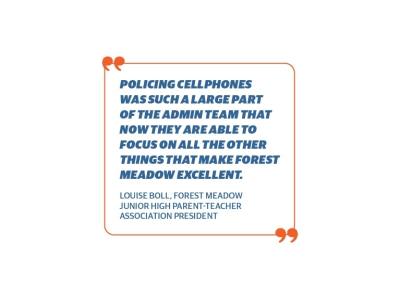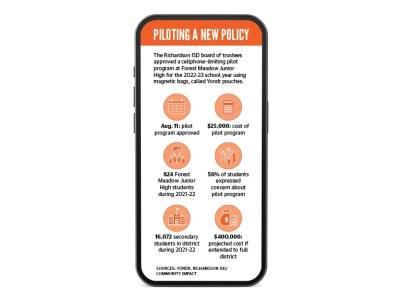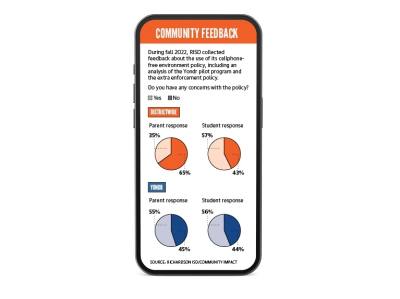Heading into the year, Superintendent Tabitha Branum said the use of cellphones during the instructional day had become pervasive throughout the district, taking away valuable instructional time while incurring a lot of disciplinary violations.
“Phone use among students, and the ongoing classroom distractions and disciplinary issues that accompany it, are causing more and more school districts to re-evaluate student cell phone use during the school day," Branum said in an Aug. 6 video posted on the district’s YouTube channel.
Branum originally proposed a district-wide adoption of a policy to the RISD board of trustees ahead of the 2022-23 school year. The proposal would have required students in grades 7-12 to put their phones in magnetic-locked bags made by a company called Yondr throughout the school day to prevent use.
However, the district scaled that back to a pilot program at Forest Meadow Junior High after parent feedback included concerns about being able to reach their children in a potential emergency situation and questions over the program’s ability to limit cellphone use. The board of trustees also revised language to its current policy.
"The overwhelming takeaway... [was] that parents almost universally agree that cellphones are a distraction for students and a problem in the classroom,” Branum said in an Aug. 10 statement. “However, not every parent is sure that the Yondr pouch system is the right solution to assist with enforcement of cellphone-free campuses.”
Yondr Director of Education Partnerships Julia Gustafson said the program is meant to aid students in lessening cellphone use during the school day, adding that administrators would likely allow a student to access their phone if needed and that the company works with schools to come up with specific plans to accommodate students.
RISD Board Trustee Megan Timme said during a Nov. 3 board meeting the district’s cell phone free policy helps achieve one of the district’s biggest goals: Teacher retention.
“Two things that [teachers] asked for was more [instructional] time and better discipline,” Timme said.
The pilot program
Branum said during an Aug. 11 board meeting the pilot program of the Yondr Pouch system, which is costing the district $25,000, helps gauge how effective the program could be.
“The advantage of a pilot program is that it will allow RISD to gather more data to see how effective the Yondr system is before investing in a district-wide solution,” Branum said.
According to a Yondr survey of the company’s over 900 school partners, 65% of schools saw an improvement in academic performance, 74% of schools saw an improvement in student behavior and 83% of schools saw an improvement in student engagement in the classroom.
The service is designed to be customized based on a campus assessment, aligning the program to what best fits the needs of each district, Gustafson said.
“Schools are attempting to do a large-scale behavior change, so we offer the services to get them supported with that in terms of supporting them with policy and practice procedures,” Gustafson said.
Under the guidelines of the RISD program, students are responsible for taking care of their individual Yondr Pouch. Students entering school are expected to put their phone in the pouch before closing and locking it using a magnetic base at the entrance of the school. The students keep their phone on them throughout the day, but are not able to open the pouch due to the magnetic lock. At dismissal, students will exit through the same entry doors and use the base to get access to their phones as they leave.
The allotment of equipment, both pouches and unlocking stations, are based on the school's current setup.
“We typically send one base for every hundred students leading to that exit point at any given time,” Gustafson said.
Cellphone free environment
Both U.S. and foreign governments have cited mental health as the main concern when focusing on cellphone use and adolescents, according to Yondr officials.
“It has become the norm that students have cell phones at increasingly younger ages,” said Kevin Brown, executive director of the Texas Association of School Administrators. “While there can be positive uses of those phones, they can also be a major distraction in the classroom.”
Most districts in the state have some type of policy that places guidelines or restrictions on their responsible use. While expectations vary from community to community, the purpose of those policies is to avoid distractions in the classroom.
The RISD board of trustees took steps to begin curbing cellphone use when it agreed unanimously to amend the district’s policy during an Aug. 11 meeting.
In the modified student code, the added district guidelines outlined new potential violations for use of cellphones during the school date, according to district officials.
According to the district’s updated guidelines, authorized employees are allowed to confiscate cellphones or other electronic devices that are misused during the school day. The student’s parents are allowed to retrieve a confiscated device after receiving notification from the district, while students may retrieve their phone at the end of the school day. In addition, disciplinary action can be applied to students who have their phones confiscated.
Community feedback
Louise Boll, Forest Meadow Junior High parent-teacher association president, said that her conversations with Principal Susan Burt have conveyed that there are less behavioral issues and more learning happening under the pilot program.
"It took some getting used to, but I feel like everyone has gotten used to the new norm," Boll said via email. "Policing cellphones was such a large part of the admin team that now they are able to focus on all the other things that make Forest Meadow excellent."
Boll said the implementation of the program and maintenance of equipment has helped parents be more comfortable.
According to a district-wide survey, 83% of teachers said they have observed less disciplinary issues regarding phones in the classroom with the new enforcement policy. In addition, 94% of teachers said they are in support of the Cell Phone Free Environment policy.
Teachers at Forest Meadow said the implementation of the Yondr pilot program made enforcing the phone policy less stressful, with 72% of teachers strongly agreeing that students are more attentive in the classroom under the new policy, according to the survey.
A majority of teachers were in favor of both the updated policy and the Yonder pilot, saying that both new phone policies have led to more than 10 minutes of additional learning time in their classes.
“I think it is significant that we can give time back to our teachers who I think are overworked and underappreciated,” Trustee Eric Eager said during a Nov. 3 meeting. “That is a large amount of time that we're giving back [to teachers] to help our kids and to help their education.”
Despite positive feedback, there were also concerns from both staff and the community toward the cellphone policy. According to the survey, 55% of parents cited concerns over it.
In the survey, parents said they were worried about the cost of the Yondr system going district-wide.
According to the survey, parents and teachers suggested continuing to adjust the implementation of the current policy before considering any additional changes or expansion of the Yondr system. One of the major concerns expressed by students and parents was about safety and communicating during an emergency situation.
“At first, parents and students were a little concerned regarding direct communication, but every teacher has a cellphone for emergencies and students are on their computer all day and able to email for non-emergencies,” Boll said.
Gustafson said Yondr has instructed teachers on the best way to handle cellphone use during a crisis, prioritizing getting to a safe position before allowing communication to parents. The company emphasizes to parents that every school has an emergency preparedness protocol.
“We [are used to] having that cellphone in our hand, so we can continually communicate between students and parents, said Joseph Miniscalco, RISD Executive Director of Student Services. “Having that feeling of having an immediate communication [between students and parents] still exists, so we need to address that going forward.”




